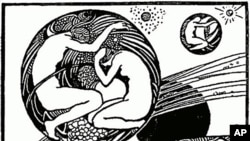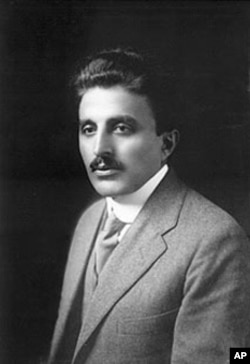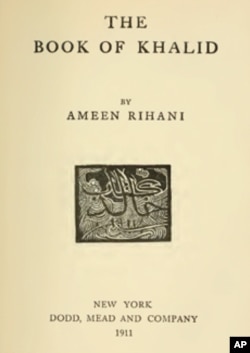The first English-language novel ever published by an Arab-American author is about to mark its 100th anniversary.
"The Book of Khalid," the story of two Arab boys who immigrate to New York City in pursuit of the American dream, explores author Ameen Rihani's hopes for harmony between the two cultures.
Nearly a century later, it's a theme that continues to resonate.
Still relevant
"The Book of Khalid" was published in 1911, but the issues it explores are still timely, says May Rihani, an Arab American poet and the author's niece.
"The whole book is about how the migrants see this new world and how an Arab — in particular — interacts with the culture of the U.S., with the daily life, with materialism and spirituality, how those two cultures interface and how those two cultures — meaning the Arab culture and the American culture — can be useful to each other and how we can learn from each other."
May Rihani says Khalid, the Lebanese immigrant and title character of the novel, turns his immersive experience in New York and American culture into a plea for political and economic progress in the Arab world.
In the novel, Khalid wonders whether the freedom he's found in America — symbolized by New York's famed Statue of Liberty — might inspire a similar birth of freedom across the Arab world.
"Is it possible that the future will witness a Statue of Liberty next to the Pyramids?" the character asks.
New meaning in post 9/11 world
The century-old tale of a young Arab's cross-cultural dream of freedom has great relevance in today's post-9/11 world.
A group of scholars and public figures plans to mark the 100th anniversary of the book with Project Khalid, a series of events meant to share Rihani's vision of U.S.-Arab dialogue with a wider American audience.
Todd Fine, Project Khalid's director, believes the novel would be especially interesting to American students, providing a unique view of Arab culture, history and the experience of Arab migrants.
One of the major objectives in the coming year will be to introduce a new edition of Rihani's novel to U.S. high school and college curricula, just one of a series of efforts planned to acquaint more Americans with "The Book of Khalid."
"Additionally, we are planning an event at the Library of Congress in March, 2011, to give the official celebration of the novel and to be a forum for experts and scholars to commemorate it," says Fine. "We are also planning a website and some media outreach that will demonstrate to the entire country the importance of the 100th anniversary of the first Arab-American novel."
According to Fine, the Khalid Project is assembling a group of American scholars, teachers and librarians to conduct a public workshop on Rihani's work.
Bridge of understanding
One of those experts is Nathan Funk, an assistant professor of peace and conflict studies at Waterloo University in Canada and the author of "Ameen Rihani: Bridging East and West."
"Here is a person who was a product of two cultures and who found much of value in both and who felt that his humanity was completed by participating in both, even though they seem at times to have some different value priorities and differences in world view," says Funk. "He actively worked within himself to get a view of the world that was large enough to include the strength of both cultures, to find places where they met and could create a basis for a fuller way of being human."
Funk says author Ameen Rihani also anticipated in the political commentary running through "The Book of Khalid," that America and the Arab world would need skilled cultural ambassadors to bridge the gulf between them and to prevent dangerous misunderstandings.
He believes that, at this critical time in U.S.-Arab relations, the title character in Ameen Rihani's 1911 novel might serve the role of cultural ambassador very ably.






